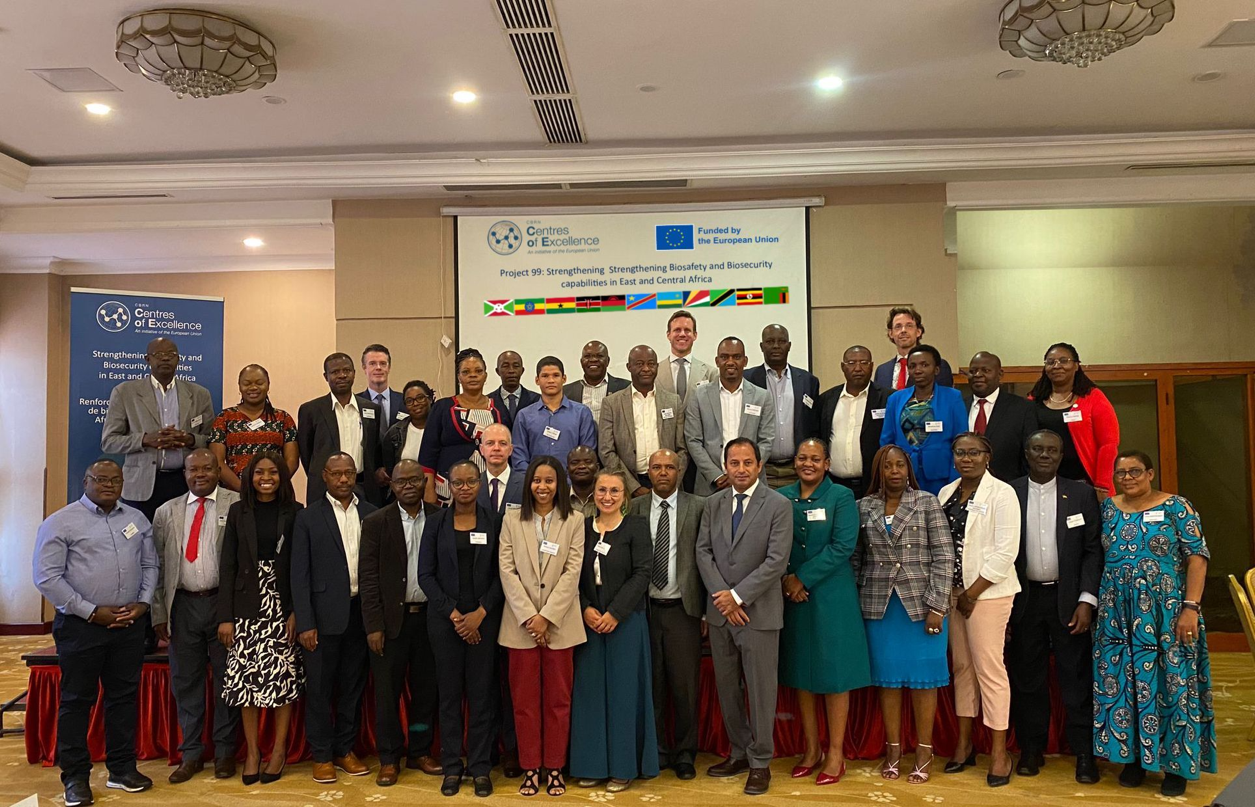
Countries in the Eastern and Central African region have undertaken significant measures to address the challenges posed by biological risks. In most countries, legislation and/or regulations have been developed and biosafety committees or frameworks are in place. However a number of gaps still remain with regards to legal frameworks, biological sciences advancements, and key areas like facility security, agent detection, and waste management.
In light of these challenges, the EU CBRN Centres of Excellence supported 11 partner countries in the Eastern and Central African region to conduct a comprehensive assessment of their state of play on biosafety and biosecurity. The collective exercise was carried out as part of the EU CBRN Project 99, focusing on 'Strengthening Biosafety and Biosecurity Capabilities in East and Central Africa'.
Impressive efforts were exerted over the course of six months by selected experts and government representatives from Burundi, the Democratic Republic of Congo, Ethiopia, Ghana, Kenya, Malawi, Rwanda, Seychelles, Tanzania, Uganda and Zambia.
An extensive questionnaire was developed to gain a holistic understanding of the participating countries' national processes for managing national biorisks and terrorist threats. The questions delved into crucial aspects such as the oversight of biological risks within each country and the existence of a national list identifying biological materials of particular concern. Additionally, the questionnaire sought information on legal frameworks, national risk assessments, ISO standards for labs, the dual use of materials, and waste management.
Sharing insights and expectations: questionnaire gives voice to partner countries
The responses provided by the countries formed the basis of country reports, which were officially introduced in a regional event held in Addis Ababa, Ethiopia, in October 2023. Praised by country representatives as “a crucial milestone” in the reinforcement of their capacities, this collaborative effort marked the next step of a 42-month process within the EU CBRN CoE Project 99.
“This questionnaire allowed us to pinpoint specific areas where Malawi requires additional support. It helped us identify significant gaps in bio-risk management systems, risk assessments, virus risk management, mapping, and the establishment of an emergency response plan,” explained Lucious Ziba, a biosafety expert from Malawi who attended the regional event.
“One of the most crucial findings of this questionnaire was the absence of legislation governing biosecurity in Malawi. The lack of such legal frameworks hampers our country’s preparedness to deal with health and diseases linked to biological agents."
In addition to providing insights into the existing practices and gaps within each partner country, the questionnaire also helped to better understand the wide array of tools and frameworks available for national risk assessments.
“We have a lot to learn but we also have a lot to share, based on our respective experiences,” stated Odette Kabena Ngandu, a microbiologist who also serves as the Democratic Republic of Congo’s National Focal Point for the Project. She says this exercise allowed her team to highlight three strengths, three weaknesses, but also three recommendations on what the DRC is expecting to achieve through the project.
“This project comes as a beacon of hope for us. We have a lot to work on, and this questionnaire - which we then turned into a country presentation shared with our colleagues - helped us to identify and present six key needs: training, legislation, awareness raising, the production of guidelines, equipment and emergency planning.”
The completion of these comprehensive reviews opened the doors for EU CBRN CoE Project 99's next phase: the development of a robust national risk assessment framework, which will serve as the backbone for biosafety and biosecurity practices in the participating countries.

Strengthening biosafety and biosecurity capabilities in East and Central Africa
Established in the context of the EU CBRN CoE Initiative, Project 99 aims to support 11 countries from East and Central Africa to enhance the detection and mitigation of risks associated with biological materials or agents, as well as risks linked to installations or sites.
Scheduled to last until June 2026, Project 99 encompasses work packages related to national legislation and gap identification, awareness raising on biosafety and biosecurity, risk assessments, contingency and response plans, as well as waste management, among others.
The project is implemented by a consortium led by Expertise France, and comprised of Liège University, RIVM, SCJS Europe and ISEM Institute. To learn more about the project, please visit the CoE Project 99
Details
- Publication date
- 21 November 2023
- Authors
- Service for Foreign Policy Instruments | Joint Research Centre
- CBRN areas
- Bio-safety/bio-security
- Border control and monitoring
- Crisis management
- Denying support for misuse and terrorism
- First response
- Illicit trafficking
- Import/export control
- Investigation and prosecution
- Legal framework
- Post incident recovery
- Protection of material/facilities
- Public and infrastructure protection
- Public health impact mitigation
- Safeguarding information diffusion
- Safety and security
- Transit and trans-shipment control
- Waste management
- CBRN categories
- Chemical
- Biological
- CoE Region
- ECA - Eastern and Central Africa
